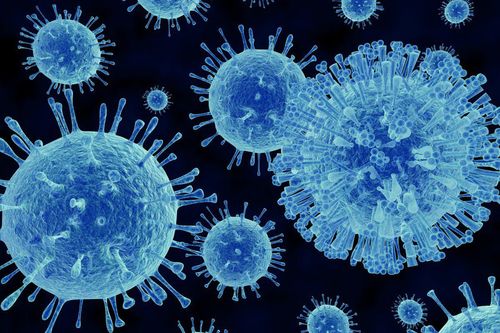This is an automatically translated article.
The child has a red rash all over the body accompanied by a fever which is a sign of typhus. As with other viral infections, children need rest and adequate hydration and fever reduction to quickly recover from illness.
1. The baby has a red, red rash on the abdomen, is it typhus?
If the child has a fever, then there is a red rash all over the body, which could be a sign of typhus.
Typhus is a disease caused by the herpes virus (not the sexually transmitted type), which usually affects children 3 months to 4 years old.
2. What are the symptoms of typhus?
Typhus usually starts with a high fever (39 - 40 degrees Celsius). The fever usually lasts 3-7 days and may end abruptly, followed by a rash.
The rash can last for days or just a few hours. The rash is pink and may have small flat or raised nodules. These spots may have a lighter "halo" around and turn white when pressed. The rash does not cause itching or discomfort and is not spread from person to person by contact. It usually appears on the trunk and neck but can extend to the arms, legs, and face.
Other symptoms of typhus include:
Irritability Drowsiness Mild diarrhea Poor appetite Swelling or drooping eyelids Runny nose Sore throat Cough Swollen lymph nodes at the neck or base of the skull If the child has a febrile seizure In the early stages of the illness, place the child on the bed or floor and turn his head to the side to facilitate vomit or saliva. The child may lose consciousness and twitch an arm, leg, or face muscle for 2 or 3 minutes. The child may also urinate or have a bowel movement involuntarily.
Although febrile seizures in children can be scary for parents, they are rarely serious or cause complications. It is important to call 911 as soon as possible after a seizure. Also, try to observe how long the seizure lasts if possible, as it helps in the diagnosis process.
Call 911 if the seizure doesn't stop after 5 minutes.

Sốt phát ban ở trẻ giai đoạn đầu là sốt cao
3. Suspect the child has typhus fever, should take the child to the doctor?
It is best to see a doctor if your child has a fever with a rash. The doctor will ask about the child's symptoms and, depending on the age and symptoms, perform a physical exam and recommend the necessary tests.
4. How to treat typhus?
There is no specific cure for typhus yet, but it is similar to other viral treatments. The most important thing is to make sure your child is resting and drinking plenty of fluids.
Acetaminophen (or ibuprofen if your child is 6 months old or older) can be used to lower a child's fever.
Another way to help reduce fever and make your child feel better is to apply a warm compress or give the child a warm bath. Instead of wrapping a towel around your body to dry off, let it dry naturally because the steam that comes out of your skin can help lower your body temperature. Babies can feel cold while they're wet, but this is an effective way to ease the discomfort of a fever without resorting to medication.
Note: Never give aspirin to children. It can cause Reye's syndrome, a rare but potentially fatal disorder in young children.

Điều trị sốt phát ban bằng cách hạ sốt cho trẻ.
5. Is typhus contagious?
Typhus spreads easily through saliva or respiratory droplets such as sneezing or coughing. It is also spread by fecal-oral contact when infected children do not wash their hands after using the toilet. Because the disease is contagious before symptoms appear, there is often no effective way to prevent it.
Ensure that all family members, especially those caring for children, wash their hands frequently. This is the best precaution during the fever phase because you don't know you are exposed and are at risk of infection until the symptoms of typhus appear.
To play safe, keep your child at home from daycare and school, and avoid contact with people while feverish. After the fever is gone for about 24 hours, the child is less likely to spread the disease, even if the rash appears.
Most children with typhus will not be re-infected because of lifelong immunity to the disease.
When a child shows abnormal signs of health, parents can take the child to Vinmec Health system for timely examination and treatment.
As a key area of Vinmec Health System, Pediatrics Department - Vinmec International General Hospital always brings satisfaction to customers and is highly appreciated by industry experts thanks to the following advantages:
gathers a team of leading doctors and doctors in Pediatrics: including leading experts, with high professional qualifications (professors, associate professors, doctorates, masters), experienced, having worked in different hospitals. big hospitals like Bach Mai, 108.. The doctors are all well-trained, professional, have a heart - reach, understand young psychology. In addition to domestic pediatric specialists, the Department of Pediatrics also has the participation of foreign experts (Japan, Singapore, Australia, USA) who are always pioneers in applying the latest and most effective treatment regimens. . Comprehensive services: In the field of Pediatrics, Vinmec provides a series of continuous medical examination and treatment services from Newborn to Pediatric and Vaccine,... according to international standards to help parents take care of their baby's health from birth to childhood. from birth to adulthood Specialized techniques: Vinmec has successfully deployed many specialized techniques to make the treatment of difficult diseases in Pediatrics more effective: neurosurgery - skull surgery, stem cell transplantation. blood in cancer treatment. Professional care: In addition to understanding children's psychology, Vinmec also pays special attention to the children's play space, helping them to have fun and get used to the hospital's environment, cooperate in treatment, improve the efficiency of medical treatment.
Please dial HOTLINE for more information or register for an appointment HERE. Download MyVinmec app to make appointments faster and to manage your bookings easily.
Reference source: Babycenter.com












